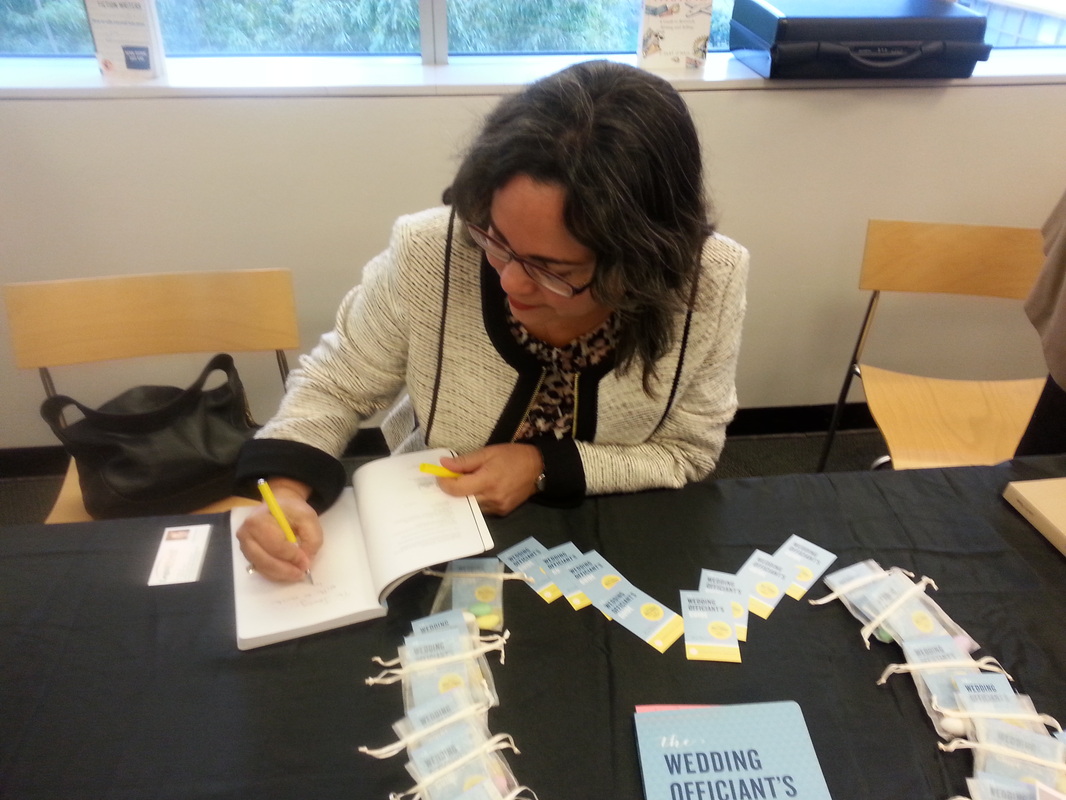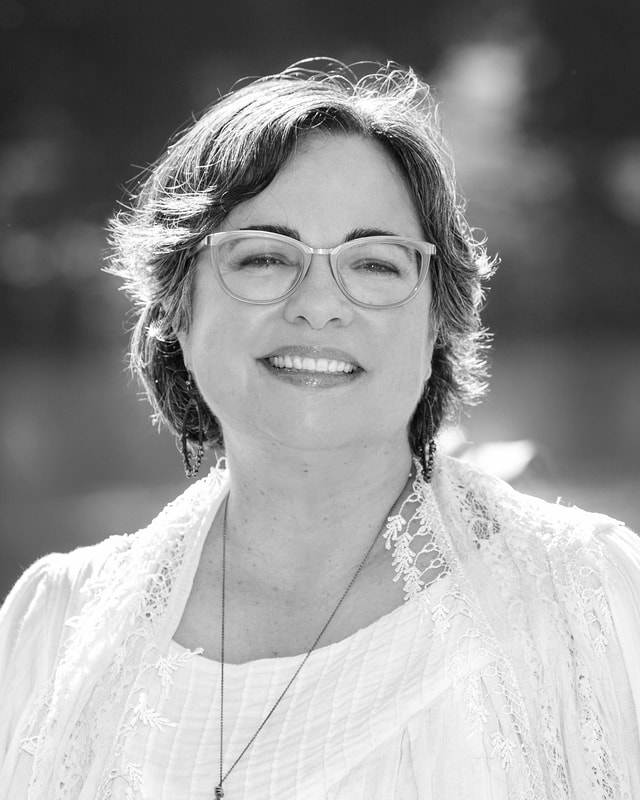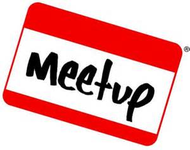 My book launched with its attendant fanfare and then quieted down within the expected ninety days. Since then I’ve been in an uncomfortable state of transition. I have a couple of books in messy progress, but no buyers for them and no incentive to finish them this year. I need an income and miss the comradeship of working with an office team. The job search has begun, though an upcoming trip overseas prevents me from throwing myself into the search 100%. So I’m neither here nor there, not very solvent, and feeling a little guilty. It’s the worst time to stay at home, though puppy, garden and my library do their best to keep me there. About a month ago I was really, really down. Searching job sites unleashes waves of detailed information. Piles of email notifications arrive daily. Some job descriptions remind me of skills I don't have, while searches on LinkedIn tell me that 885 other people applied for the same job as me. Like many thousands of others, I write persuasive cover letters and keyword-loaded resumes, and they sail off into silence. Enter MeetUp. One day I found my way to the site and started to pick out Meetup groups to join. Fancy meeting other human beings in a neutral place based on a common interest! The first group I attended is called Shut Up and Write. What a boon to an isolated writer. I met five people in a coffee shop. We opened our laptops and chatted while we got settled. After fifteen minutes, everyone shut up and wrote for an hour. Two people worked on their novels, another on her thesis, another on game development, and we had a blogger. It was SO helpful to hear keys tapping around the shared large table. Win, win, win. Then I started taking walks with Vintage Women. We explored new parks and neighborhoods. One day Meetup suggested a job networking group called CSix Connect. As formal and volunteer-driven as a Toastmasters meeting, CSix presents a chance to dress up and network, which pushed me into a better career groove: after the first meeting I cut my hair and ordered fresh business cards. Through the CSix meetings I found a subgroup that studies the sustainability and renewable energy industries in my area, so that I am finally connecting my interests. My current elevator speech: "I can evangelize green technologies!" The first event with Unstoppable Women of Silicon Valley netted marvelous conversations with women who are on interesting, inspiring career journeys. I came home with ten follow-up action items, feeling excited. There are four events to prepare for and attend this week, and who knows what might happen from them? It’s a little scary meeting all these new people, but I can see that it's radically increased my mental diet of positive, interesting information, and enlarged my sphere of connections across the valley. 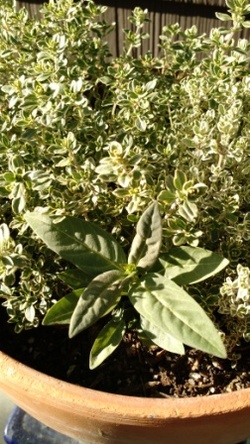 Milkweed, thyme Milkweed, thyme I took a Sustainable Vegetable Gardening class at the community center. Taught by Master Gardeners, the class met weekly for two hours. I arrived with a dismal record for keeping vegetables and plants healthy. The land in our back yard is a tightly compacted clay that has already broken a number of my husband’s picks, rakes, and shovels. My goals: Learn about soil; feed my own compost and amend my soil; grow one thing (probably a tomato plant); and learn what plants attract bees, butterflies, and ‘beneficial insects.’ Results: I learned that I am not THAT into gardening, and decided not to build veggie beds this year. Yet I gained an almost rapturous appreciation of soil. Did you know that 2/3 of a plant’s biomass lives underground? That soil is the living edge where earth and sky meet? That the processes which occur in the top few centimeters of the earth’s surface are the basis for ALL life on dry land? 2015 has been declared an International Year of Soils. Awareness of soil is profoundly important to how we understand food security, water availability, climate change, and the alleviation of poverty. One teaspoon of composted soil (which is fluffy and smells good) contains more than 40,000 different species of yeasts, algae, and molds; seven miles of fungus filaments; 10 trillion bacteria, 100 billion fungi, 10 billion protozoa, five billion nematodes and larger critters. Fairly bursting with life. Influenced by the classes, I began feeding my lackluster compost pile with coffee grounds and all our fruit and veg trimmings, and watering it regularly. It suddenly began to act like compost! Then I put a mound of this black gold on the roots of an anemic azalea and watered it with our shower-catching bucket. Now that azalea is putting out the biggest blossoms I’ve ever seen. It wasn’t that hard. The class offered some unexpected benefits: Tips and pamphlets about drought tolerance, worm composting, handling all kinds of garden pests. A bag of mixed seeds for a wildflower garden that will attract beneficial insects! And two baby milkweed seedlings, the preferred food of the Monarch butterfly. Along the way I picked up (and planted) a baby fig tree, a healthy tomato plant, golden and silver thyme, and three fuchsia plants. So far they are all still living, the thyme even thriving. This was a useful action. Yes it’s a dry spring in California. Nonetheless plant and vegetable and tree roots inch along, lengthening as they reach for water and warmth. That word ‘lengthen’ shares a root with the Festival of ‘Lent,’ also occurring now.
The Catholic season of Lent is about removing distractions, sending our own attention and energy inward and downward, a forty-or-so day meditation before we flower into action. Indeed, a radical action is one expressed from our root. I attended a gathering of about four hundred souls last weekend, a mix of farmers and urbanites, natives and immigrants, scientists, writers, artists, meditators, gardeners, and activists — we filled up a whole school in the town of Point Reyes Station. At the conference, called Mapping a New Geography of Hope, we listened to really thoughtful people getting at the root of things. The planet is heating up. People are acting badly. Others do healing and reparation of wrongs done to our forests, cultures, and oceans, and still others create necessary visions and plans for a good life on a healthy planet with sustainable, balanced systems. Which gave me the questions to ponder: · What do I love too much to lose? · What will I do to protect what I love? · What does the Earth ask of us? With my own talents, what are my responsibilities? · What can be gathered from our ancestors, and from local ancestors (for me Silicon Valley and the Bay Area), that will help us heal our land and water? · How am I letting my attention and body be colonized by corporate interests? · Why are rhinos, bears, monkeys and sharks being slaughtered to extinction for increased sexual potency? · How can I, in a nation that uses 30 times the resources of other nations, calm my own consumer desires? · How can I shape the next chapter of the Silicon Valley / Bay Area story? In January I went to a silent retreat for the first time.
There I sat on a cushion on a mat, facing another soul in a room of about sixty, feeling my poor, overstretched knees go numb yet again. How did I get to this wretchedly uncomfortable place? Before coming I could MAYBE meditate for 20 minutes, a few times a week, and had always felt positive that more than a day of silence would be intolerable. We had been kind of tricked into it, you see. My mother had met a teacher of zen koans in New Mexico, and now he was offering a winter retreat in Santa Rosa. I explored his web site and I'm pretty sure that nowhere on the site were the words, “You will sit thirty minutes, walk fifteen, sit for thirty more, walk fifteen, sit for thirty more, walk for ten, and then have breakfast. Then start the whole thing over from breakfast to lunch, from lunch to dinner, etc.” Had they been there, even a hint, I probably would not have signed up. But here we were. The first two days were hard, hard, I’m not going to lie. My brain was not used to being held to a schedule and screamed at me all night long with crazy rhymes and bits of music and chatter. But then it got better. By the fifth day I felt stable, spacious, and integrated, the way I used to feel before adolescence. All through the week I noticed the sounds of silence: 6 a.m., many people in a dark library lit by candles. We've all had a sip of green tea and, here and there, stomachs growl. The shaft of morning light lengthening as it finds its way down the wall. A barefoot teacher walking very, very slowly across the carpet and bowing to students. The collective silence of people eating, eyes downcast to preserve everyone’s privacy. In this space, I discover the miracle of how extraordinary simple food tastes when you are not busy chatting about something to someone. The warm silence when a morning fills with bird calls, and then they all cease. The peace of one's tiny room upstairs, very different from the meditation hall. Students pondering a koan late at night by the fireplace. Space to hear the cracking and snapping of a lit log. Within that mysterious palace of silence, my spine grew and my senses sharpened. Gladness grew in my heart. Was it that simple? We carry our breath wherever we go. One morning I walked through the garden. Across an expanse of brown twigs, the tangy coral of crab apple blossoms shouted out to me. 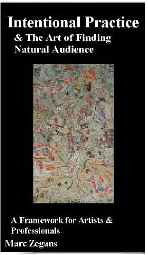 “When artists and professionals regularly accept responsibility for their actions, they shape deep, rich, and evolving pictures of who they are, pictures that permit them to act consistently with emerging notions of their authentic selves.” Intentional Practice & The Art of Finding Natural Audience: A Framework for Artists and Professionals. Marc Zegans is a poet in Santa Cruz, California who provides creative development advice to artists, musicians, actors, directors, and other creatively minded professionals such as therapists. He wrote a brilliant, very slender e-book a few years ago and put it on Amazon at such a ridiculously low price that it should already rest in the toolbox of every artist and professional. I recently re-read it and was reminded of how I want to function as an active, authentic, ethical artist and minister, and where my natural audiences might be. Based on my working session with his book and his penetrating questions, I now know exactly how I will overhaul my website and blog in the next few weeks so that they more accurately reflect who I am. If you want to know more about Marc and the many creatives and professionals he’s helped, trot on over to www.mycreativedevelopment.com. Meanwhile, here are two more of many, many gems from his book: “Your natural audience isn’t everyone you can pull into the room; it’s the group of people who have a good reason to be there.” “Often, we claim that authenticity and integrity demand distance as a rationale to cover our fear of engagement. When such claims are based in fear, there is nothing authentic about them. We are using a ploy to protect ourselves from finding out how good we really are, what we can do when we have resources, and what we will do when we don’t.” A week before the book was to launch, I grew so restless. I paced and fretted. I had completed every task I set out to do for the book. What would the launch look like?
Every day that week I watched the title rise in Amazon ranking from about a millionth place to as high as 131,000. It went down a lot, too! So I stopped watching before it became too stressful a habit. On December 2, at 12:30 in the morning, I woke up and learned what the launch looked like: Satisfaction. Joy. All alone in the dark, I felt a very steady sense of accomplishment. The book is published and can live on its own in the world. Later in the day I checked back in with my feelings, over a latte and pear-ginger croissant. Yep, that steady warmth was still there. That evening I had some dear friends over and we laughed and chatted over lasagne. I opened a couple of tins of blackfish caviar, and a few bottles of Sofia sparkling wine. That good feeling? Still there. Still here. Hallelujah. 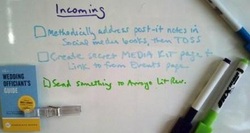 Promotion on social media is full-time work. Here’s how I’ve gone about it. Massive research I read eight books about promoting books. I underlined and tagged them, and kept a notebook with a page dedicated to each element of the publicity strategy: biography, elevator speech, ideal city-tour plan, etc. Lots of lists. I repeatedly worked through a 26-page online list that Chronicle Books offers authors as I came up to speed on social media. Creating physical space A month ago it was hard to work in my home office. Looking back, no wonder! The space was crowded, especially with things that weren’t actually mine, and at the same time, scattered. The sight of them siphoned my attention from The Wedding Officiant’s Guide. I removed what didn’t belong (including seven bags of books), and sorted what remained to align with one purpose: promoting this book to the best of my ability. Setting up posts in cyberspace My web site. Amazon. Goodreads. Twitter. An account at Chronicle Books. Pinterest. Facebook. Step by step I set them up, and then began many weeks of "checking my fences" and making the adjustments. Sorting and listing action items In the newly calm, airy space, I set up two whiteboards. One tells me what to do. I list tasks for this week, and also incoming ideas. On Friday, the task list is mostly erased, so the incoming list becomes next week’s tasks. The other whiteboard records the seeds I’ve sown, sprouts to tend, and little miracles. And I list angels, people who have shown extraordinary support in this venture. My heart is full of gratitude for these publicity angels Stephanie Wong, my publicist at Chronicle Books who valiantly connects copies with reviewers and pitches with the media. What an amazing Grace. Jennifer Randolph, my publicity coach. We’re going to an Oprah event and bringing business cards! Jenny Walicek, who is extending her hand to me from high on the social media learning ladder saying, “Reach up and grab hold, you’ll be fine!” Cathleen Miller, whose weekly two-pagers and kind words grew my blogging muscles. And whose example of organized book writing is positively inspirational. The splendid writers and teachers Kate Evans, Mary Reynolds Thompson, and Kyczy Hawk, whose brave examples show that if I take simple steps from a heart-led space, I, too, can become a citizen of their caring, committed, literary world. One of my heroes will arrive soon in my metropolis. Actually, she is also bringing several of my heroes with her.
This is not a paid announcement; Oprah and her extensive staff have no idea of my existence. But the fact of her coming to what we still call “The Shark Tank” in downtown San Jose—and that I am going to spend an evening and a day as part of the audience--seems so mighty as to be blog-worthy. I came to Oprah late. You can find all kinds of stories about her success in television: the boundaries her show pushed, her rise through multiple glass ceilings. Not much of a TV watcher at the time, I first found her while sifting through the library’s free magazine box for collage materials. I judged O Magazine to be an excellent source of colorful images and paper (it still is. So is Martha Stewart Living). Over time, my issues of O magazine grew too full of relevant articles and pithy wisdom to cut up. I bought a subscription. Oprah had already started building an academy for girls in the Gautang province of South Africa; she produced movies; the episode where she dragged a wagon of lost fat onstage was already legend. She graduated from her TV show and began to tackle the huge issues of running a network. That's when my love affair with her "Super Soul Sunday" program began. I record the shows and dip into them while I make dinner on weekdays. With the advent of her interviews with people whom I can only describe as "awake," I realized Oprah herself has become one of my strongest spiritual teachers. She delights in wisdom, refuses to stick to one dogma, and broadcasts what she finds. She's creating and maintaining a world-class interfaith seminary, freely open to anyone with access to a television. I hold her in a category with Joseph Campbell, Carl Sagan, and Dr. Matthew Fox. She walks her talk and puts her money behind these lofty goals. I want to do something good in the world like she does. My other heroes who might be there: Elizabeth Gilbert, Dr. Deepak Chopra, Iyanla Vanzant, and Rob Bell. The show is titled “The Life You Want,” and I feel blessed to be already leading one, so I don’t plan to change course radically. But I am drawn to these beautiful souls, and want to absorb as much wisdom I can. It easy for me to tell that autumn has come. I find myself reaching for long-sleeved shirts and boots, thinking about food.
A restless urge stirs inside me so that I sort through my bookshelves, releasing seven bags of books I no longer need. And I think about food. I’m compelled to sort the family’s flannel sheets and throw out plastic lids with no containers, thinking wildly about food. Fall food. Roasted butternut-apple-onion soup. Roasted beets in mango balsamic vinaigrette. Kubocha pumpkin soup --- it doesn’t get any easier. Roast it and purée with the stock of your choice. If you want to get fancier, quinoa salad with minced red onion, feta, orange segments, arugula, cilantro, mint, and chopped dried cranberries and apricots. Slivered almonds optional. Oatmeal with persimmon, banana, walnut, and cranberry. No sugar or milk needed. Pears baked in apple juice with cinnamon and vanilla. Or just an Asian pear (also called apple pears) thinly sliced, with a cup of ginger honey tea. Mmmmmmmmmm. 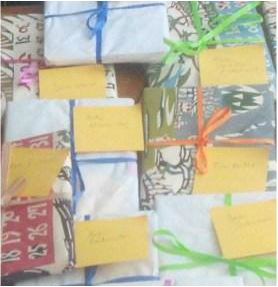 Last Thursday I got one of the most exciting e-mails of my life. "Hello," it began, "I’m an editor with (a wedding magazine) and we’ve decided to feature your book in our review section of the winter/spring issue. . ." At the fall equinox in 2014, it’s almost hard to remember June of 2012 when I signed the contract with Chronicle Books and sat down to write The Wedding Officiant’s Guide. I sent my huge, messy draft to Doris Ober late that year. Doris is a meticulous independent editor as well as an excellent author. The rewriting took another nine months, and then I began to polish the story with Lisa Tauber and Dawn Yanagihara, my wonderful editors at Chronicle Books. Gradually, the book rose out of my hands and flew off to live with the editors, designers, and producers, and I sat alone at my dining room table surrounded by vast silence. The book publishing process moves glacially when you are used to blogging. I countered the loss by creating a wildly improbable publicity scheme for myself and biting my nails. Special cross-marketing events, national touring, knocking on Martha Stewart’s door. . . none of this has happened yet, and it probably won’t even be approved when I do get my fifteen minutes with the publicist at Chronicle Books. But something happened off of my radar, something marvelous. The publisher sent me a handful of author copies of the actual, adorable little sky-blue paperback, which I wrapped (as you see in the picture above) and mailed to all the people I interviewed for the book. But at the same time, Chronicle sent a bunch of the books (50? 100?) to reviewers and magazines. Seeds were sown (have I mentioned how cool it is working with Chronicle?) and now I’m seeing tiny green leaves breaking the loamy surface. |
|

